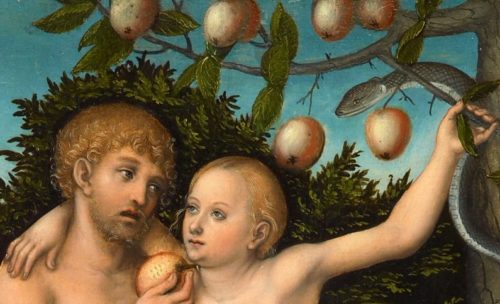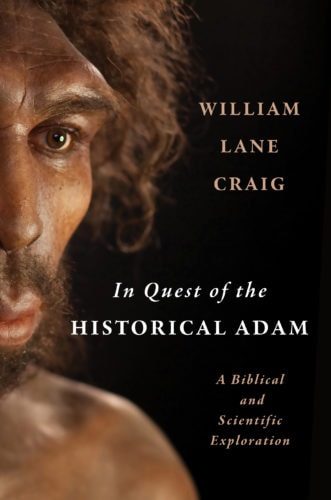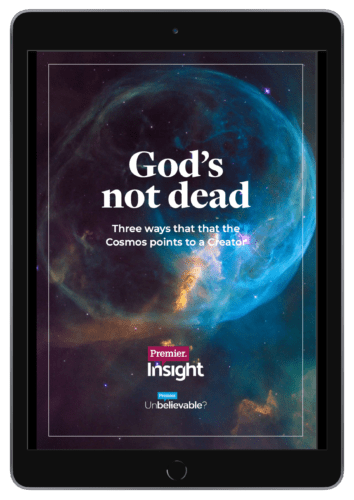
Don’t dismiss Adam, Eve and the Genesis story. It’s more relevant today than ever.
Posted:Erik Strandness thinks that the quest for an historical Adam (to coin the phrase from William Lane Craig’s new book on the subject, as discussed on Unbelievable?) might be leading us to make the wrong assumptions about what Genesis is really trying to tell us.
Reality is Stranger than Fiction
We humans are odd creatures. We are flesh and bone yet are obsessed with soul and spirit. We forage and mate yet we thank God for our daily bread and declare that what God has joined together let no man put asunder. We work the ground yet when the rains don’t come we appeal to the heavens. We love and worship. We seek purpose and meaning. We serve and demand justice. We think; therefore we are…different. Curious as to why we are so strange we scrutinize the Book of nature but find no answers and are forced to turn to Holy Books to explain why, when our feet are so firmly planted on the ground, our heads are so often soaring in the clouds. As it turns out, reality is stranger than fiction.
Our uniqueness causes us to ask about our family tree. Did our distant relatives swing from trees or paint on cave walls? Were we created in a divine image or did we evolve and only later get a seat on the soul train? Did Adam and Eve exist or were they archetypes of all humanity? Is orthodox theology dependent on a historical couple or is it enough to say that they were mythical figures who embodied true humanity? Christian philosopher William Lane Craig, author of the new book, In Quest of the Historical Adam, and computational biologist Joshua Swamidass, author of The Genealogical Adam & Eve, sat down with Justin Brierley to discuss these important questions.
Wand Waving
It would be odd to conclude that it is better for the lion to lay down with a lamb if we just evolved over millions of years. It would be surprising to behave so anti-algorithmically if our brains were just meat computers. It would be odd to be so spiritually obsessed if we hadn’t been God breathed. It would be strange to think life should be better than it is without memory of an idyllic Eden. As it turns out, materialism has never been very good at explaining our human quirkiness.
Well-meaning Christians with different theories of Adam and Eve all recognize that our human exceptionalism can only be explained by appealing to a supernatural being, and even if it all began in a warm little pond, they all acknowledge that a Magician hovered over it. The difference being that theistic evolutionists picture it like Mickey Mouse’s chaotic wand waving in the Sorcerer’s Apprentice while Intelligent Designers view it as the precise motions of a Conductor’s baton.
Mytho-history
Craig, in his research, concluded that in order to harmonize science, philosophy and theology, Genesis is best understood in a folklorist sense as Mytho-History.
“A myth is a traditional sacred narrative told in a culture which attempts to ground that culture and its values in events in the deep primordial past. These myths will typically involve grand themes like the origin of the world, the origin of humanity, the flood, and so forth…This type of literature shouldn’t be pressed for literalistic precision. It uses figurative language and metaphor and images to communicate deep theological truths…This is the difference between pure myth and what Jacobsen called Mytho-History, we are here dealing with people that were real and actually lived.”
Genius of Genealogy
Craig pointed out that Mytho-History is a genre that attempts to answer metaphysical questions and was characteristic of many Ancient Near Eastern (ANE) creation stories. He does, however, point out that Genesis is unique because it emphasizes genealogies which intimately connect it to real history.
“The same sorts of grand themes that you find in Genesis 1-11 are characteristic of other ancient Mesopotamian myths. Now this does not, I argue, show borrowing on the part of ancient Hebrews, but what it does show is that it’s the same kind of literature. It belongs to the genre of myth in the folklorist sense, but it is also coupled with these genealogies that structure the primeval history and that shows a historical interest. It tries to locate these events in ordinary causally connected human history.”
Many would point to these genealogies as proof that Genesis is a reliable historical retelling of primeval events. But what if genealogies were written to make metaphysical truths physically relevant, to firmly plant heavenly imagination in the solid earth? I am often reminded by my wife that the hours I spend writing blogs make me heavenly minded but of no earthly good. I can write about Eden but our vegetable garden still needs weeding. The genius of genealogies are that they tell us to pay close attention to the text because a myth with boots on the ground is far more connected to reality than a myth with its head in the clouds.
Divine Curriculum Vitae
The Genesis story clearly depicts two original human beings created de novo by God. The question is not what the text says but how we are to interpret it. If Genesis was written when the Hebrew people were wandering the desert and was intended as a curriculum vitae for a God they only knew as a pillar of fire and cloud then what made His resume so dazzling?
After 400 years of captivity in a country of competing gods, the Hebrew people’s memories had faded and so God tasked Moses with the job of reintroducing the people of Israel to the God of their fathers. He not only taught them His name but gave them His divine resume because with so many regional divine applicants he had to give them good reasons to make YHWH their CEO.
Genesis is Still Talking About Us
I suspect that a Hebrew people steeped in Egyptian and Mesopotamian creation myths wouldn’t have been surprised to hear about a God who could make a universe in only six days or to form two humans from the dirt. What would have really surprised them was that it was a one-Man operation and that no gods were killed in the process.
They would have been astonished to learn that the world had been created in an intentionally orderly fashion through a rhetorically well delivered creation speech rather than as the fall out of petty god squabbles.
They would have been surprised to learn that every piece of the natural world was morally good and that it worked together in an ecologically very good way. They would have been shocked to find out that humans were created not to do hard-labor for the god’s but to be vice regents of God’s good creation. Finally, they would have been stunned to find out that the world’s metaphysical problem wasn’t irritatingly noisy humans as described in other ANE myths but image bearers who repeatedly engaged in divine coups.
It’s interesting that the Genesis narrative is surprisingly sparse compared to other ANE creation myths. While it certainly has magical trees and a talking snake, it is largely devoid of divine drama. It’s actually pretty matter of fact, which is why I think many people feel so comfortable reading it literally. It contains profound truths with very little window dressing. Sadly, we get so enamored with the curtains that we miss the spectacular view that it affords us.
We miss the power of the Genesis narrative if we spend all our theological and scientific energy focusing on the age of the earth and the de novo creation of a first couple. Genesis is powerful because it is unlike any other ANE creation text and it remains the only one that is still anthropologically relevant today. The Enuma Elish, Eridu Genesis, and the Theology of Memphis, to name but a few ancient myths, are just historical curiosities with little contemporary relevance, yet Genesis still has a lot to say about us today.
Craig pointed out that ANE creation myths were designed to answer big metaphysical questions but I find it fascinating that the only one whose answers have stood the test of time, even after those questions have become more scientifically nuanced, is Genesis. It appears that we are still talking about Genesis because Genesis is still talking about us.
Artifact or Anthropology
I would argue that the Adam and Eve story is more important for human anthropology than hominin biology. Questions revolving around whether Adam and Eve truly represented de novo creations or were selected members of a population of primitive hominin are fascinating but were simply irrelevant to its original audience. Ancestry.com had yet to open up an office in the wilderness and offer their DNA testing kit so the story of an original pair wasn’t genetically relevant. The narrative, however, was critical for informing the Chosen People who it was Who chose them and the plans He had for them.
The Hebrew people wouldn’t have been impressed with a god forming humans from the dust of the earth and breathing into them because they had already heard plenty of stories of humans being created with clay and the blood of gods. Highlighting an original male and female wouldn’t have been surprising to a human race who were already well versed in the birds and the bees. The more stunning revelation would have been that both male and female were integral to the image of God. Genesis appears to be more interested in anthropological archetype than genetic artifact.
Conjuring Consciousness
I think the real issue at stake is the degree of God’s involvement in the creation of humans. Theistic evolutionists believe that humans evolved from primitive hominids and then later qualified for a spiritual upgrade. Intelligent designers believe that humans were designed and equipped with image bearing from the beginning. So the question is whether God uniquely created humans or just breathed into the evolutionary hand He was dealt?
One of the problems that occurs when you chronologically separate biology and spirit is you open up the possibility of a Platonic dualism which makes the physical inferior to the spiritual thereby rendering God’s very good world morally suspect. Interestingly, the archeological evidence for hominin ingenuity, creativity, and worship practices keeps getting pushed back farther in time, so much so that Craig recognizes Neanderthals as human. It appears that these unique human qualities didn’t emerge from a critical neuronal mass but were already present in the air they breathed.
The Last Word on the First Words
Genesis raises many interesting modern questions but we need to remember it was written to a people who had little interest in the age of the earth or de novo creation of humans. They already knew that any ANE god worth his or her salt could pull that off. Genesis was a radical text because of the God it revealed and the metaphysical questions it answered. Humans have puzzled over their own quirkiness for thousands of years and finding no earthly resolution have turned to the heavens. Mytho-History has tried to deal with this issue by linking heaven and earth. However, the only myth that has successfully achieved that goal is Genesis and we know this because it is the only one that is still relevant today.
While Genesis introduced the Hebrew people to a God unlike any other it also made them think about themselves in a radically new way. The pagan myths tried to honor human exceptionalism by giving the gods human qualities but Genesis turned the tables and described a God who gave humans divine qualities. Adam and Eve’s relevance as biologic progenitors with genes to pass on is minimal compared to their importance as image bearers with a story to tell. So let’s be very careful not to lose them in scientific debates over chronology and biology but find them as crucial characters in the greatest story ever told.
Erik Strandness is a physician and Christian apologist who has practiced neonatal medicine for more than 20 years.
Watch the discussion “Did Adam & Eve Exist?”

